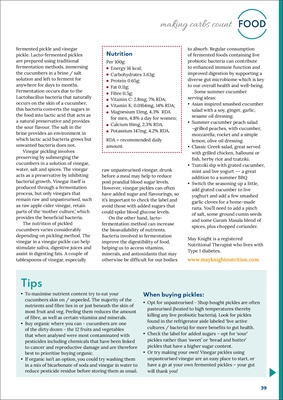
39
FOOD
making carbs count
fermented pickle and vinegar
pickle. Lacto-fermented pickles
are prepared using traditional
fermentation methods, immersing
the cucumbers in a brine / salt
solution and left to ferment for
anywhere for days to months.
Fermentation occurs due to the
Lactobacillus bacteria that naturally
occurs on the skin of a cucumber,
this bacteria converts the sugars in
the food into lactic acid that acts as
a natural preservative and provides
the sour flavour. The salt in the
brine provides an environment in
which lactic acid bacteria grows but
unwanted bacteria does not.
Vinegar pickling involves
preserving by submerging the
cucumbers in a solution of vinegar,
water, salt and spices. The vinegar
acts as a preservative by inhibiting
bacterial growth. Vinegar itself is
produced through a fermentation
process, but only vinegars that
remain raw and unpasteurised, such
as raw apple cider vinegar, retain
parts of the 'mother culture,' which
provides the beneficial bacteria.
The nutrition of pickled
cucumbers varies considerably
depending on pickling method. The
vinegar in a vinegar pickle can help
stimulate saliva, digestive juices and
assist in digesting fats. A couple of
tablespoons of vinegar, especially
Tips
• To maximise nutrient content try to eat your
cucumbers skin on / unpeeled. The majority of the
nutrients and fibre lies in or just beneath the skin of
most fruit and veg. Peeling them reduces the amount
of fibre, as well as certain vitamins and minerals.
• Buy organic where you can - cucumbers are one
of the dirty dozen - the 12 fruits and vegetables
that when analysed were most contaminated with
pesticides including chemicals that have been linked
to cancer and reproductive damage and are therefore
best to prioritise buying organic.
• If organic isn't an option, you could try washing them
in a mix of bicarbonate of soda and vinegar in water to
reduce pesticide residue before storing them as usual.
When buying pickles:
• Opt for unpasteurised - Shop bought pickles are often
pasteurised (heated to high temperatures thereby
killing any live probiotic bacteria). Look for pickles
found in the refrigerator aisle labeled 'live active
cultures / bacteria) for more benefits to gut health.
• Check the label for added sugars - opt for 'sour'
pickles rather than 'sweet' or 'bread and butter'
pickles that have a higher sugar content.
• Or try making your own! Vinegar pickles using
unpasteurised vinegar are an easy place to start, or
have a go at your own fermented pickles - your gut
will thank you!
raw unpasteurised vinegar, drunk
before a meal may help to reduce
post prandial blood sugar levels.
However, vinegar pickles can often
have added sugar and flavourings, so
it's important to check the label and
avoid those with added sugars that
could spike blood glucose levels.
On the other hand, lactofermentation
method can increase
the bioavailability of nutrients.
Bacteria involved in fermentation
improve the digestibility of food,
helping us to access vitamins,
minerals, and antioxidants that may
otherwise be difficult for our bodies
to absorb. Regular consumption
of fermented foods containing live
probiotic bacteria can contribute
to enhanced immune function and
improved digestion by supporting a
diverse gut microbiome which is key
to our overall health and well-being.
Some summer cucumber
serving ideas:
• Asian inspired smashed cucumber
salad with a soy, ginger, garlic,
sesame oil dressing.
• Summer cucumber peach salad
¬grilled peaches, with cucumber,
mozzarella, rocket and a simple
lemon, olive oil dressing.
• Classic Greek salad, great served
with grilled chicken, halloumi or
fish, herby rice and tzatziki.
• Tzatziki dip with grated cucumber,
mint and live yogurt ¬- a great
addition to a summer BBQ
• Switch the seasoning up a little,
add grated cucumber to live
yoghurt and add a few smashed
garlic cloves for a home-made
raita. You'll need to add a pinch
of salt, some ground cumin seeds
and some Garam Masala blend of
spices, plus chopped coriander.
May Knight is a registered
Nutritional Therapist who lives with
Type 1 diabetes.
www.mayknightnutrition.com
Nutrition
Per 100g:
Energy 16 kcal;
Carbohydrates 3.63g;
Protein 0.65g;
Fat 0.11g;
Fibre 0.5g;
Vitamin C: 2.8mg, 7% RDA;
Vitamin K: 0.0164mg, 14% RDA;
Magnesium 13mg, 4.3% RDA
for men, 4.8% a day for women;
Calcium 16mg, 2.3% RDA.
Potassium 147mg, 4.2% RDA.
RDA = recommended daily
amount.